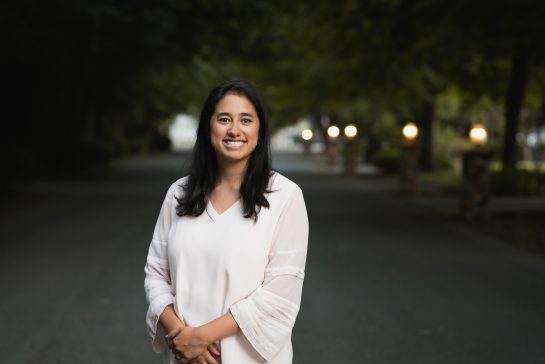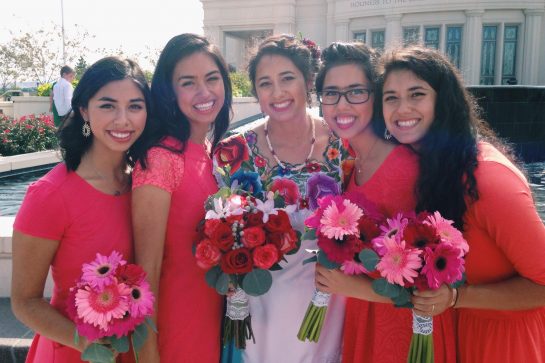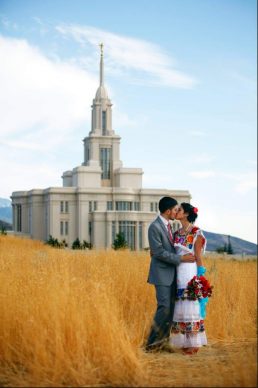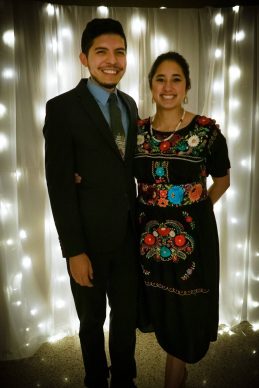Maya Yerman Sanchez was raised primarily in Mexico and attended the Church-owned Benemerito High School as a teenager. She served a Portuguese-speaking mission in Cape Verde. She views being multicultural as a blessing, as she blends her varied heritage from the U.S. and Mexico in her life. (Haz clic aquí para leer la entrevista original en español.)

Maya Yerman Sanchez
Where did you grow up and what was your family life like?
“Where I’m from” was always a hard question to answer while growing up. I was born in California, but most of my childhood was in Mexico. I lived in Mexico from ages two to twelve, lived in Utah for a couple of years, and went back to Mexico to attend the Church boarding school there, the Benemerito. The campus is now the Missionary Training Center. My family stayed in Utah, so I wasn’t living at home from age 15.
My mom and dad are both from the U.S. but my mom is a first-generation Mexican American. She grew up speaking Spanish; her dad was a migrant farmer. My parents met at BYU and they’re both educators. They had five girls so I only have sisters – it’s really great, we’re all really close. My family is very supportive and very close. We’re very open and we love each other a lot. I consider my sisters my closest friends and I think that they feel the same. That’s how I would describe my family.
After we were born, my parents decided to do international education and went to Mexico because of that.
Why did you decide to go to the boarding school in Mexico?
After we lived in Mexico, my dad was hired by the Church to be the Director of Elementary and Secondary Schools. He went to the school in Mexico City often. We had been there when we were children because all the members in Mexico know that school in Mexico City. When we were living in Utah, we visited Mexico again to see friends and family. We visited the school and I told my dad, “I am going to come here.” I don’t think I realized it then, but it was definitely a strong spiritual impression that I had to attend. I did the whole application myself. My dad told me what I needed to do, but I wrote my essay, did what I had to do to get in, then ended up going when I was 15. I remember thinking when I got there, “What am I even doing here? How did I end up here?” It happened so quickly. My life just kind of led me there somehow. Attending that school has definitely been one of the best experiences of my life.
Did you have to convince your parents? Were they nervous about it? Did they know enough about the school to trust it and feel good about sending you there? That’s young!
That is young! I don’t know what was going through their minds but my dad visited maybe twice a year so they knew I’d see him, and I would obviously go home for vacation. My mom didn’t get to have similar experiences while growing up because of finances, like study abroad, so she was very excited that I could go and experience something like this. Another thing is that it was run by the Church and had a long history. I had family who worked there, aunts and uncles. I had cousins from Mexico who had gone there. So my parents were familiar with the school. I’m sure they were nervous to some degree, but I think they were overall excited.
I enjoyed Utah, but out of my sisters, I definitely had the strongest connection to Mexico. I think my parents noticed that and saw that maybe I would be happier if I went back, and I was. I felt totally happy and just enjoyed the experience. I was at the Benemerito for two years and graduated from there. I was definitely happy, and my parents were really happy that I attended.

Maya Yerman Sanchez with Sisters
What were some of the differences in your church experience between Mexico versus Utah? What were some of the cultural differences?
My family attended an expat (people living outside their native country) ward in Mexico City when I was younger, so almost everyone spoke English, and the majority of the members were from the U.S. There’s no ward boundary for it – everyone who speaks English who wants to can attend there. It’s called the Lomas Ward in Mexico City. Many people work for the embassy or the U.S. government, or multinational corporations. I felt like a lot of the members were doers, so things always worked the way they were supposed to. It was also neat to grow up with kids from all over the world, from so many different countries. There was a lot of support for all of the activities. I realize now that not every ward is that way. Because the ward was in English, I didn’t feel a huge transition when we moved to Utah. I was about 12 when we moved to Utah – when you’re that age, I think you don’t feel those differences as much.
I felt a bigger transition from my high school experience to my college experience. In high school, you are experiencing a lot more, and you understand more of the cultural differences. I went from a student ward of 15 to 18-year-olds in Mexico City to a student ward of 18 to 25-year-olds in Provo, Utah. So that was a big difference.
The gospel is obviously the same, but every culture gives it a different feel. There’s a warmth and connection that was more difficult for me to feel in U.S. English wards. Not that there wasn’t friendliness or activities, but there’s a little more structure in the U.S., which is nice, actually, but seemed less organic. I had to get used to it. It was just easier for me to feel included in the wards in Mexico. You are instantly family. However, sometimes there was a lack of structure to a fault. Everything starts a little bit late in Mexico and goes a little bit longer than it should, so you have to be comfortable with this slight lack of structure. I think if someone came from a U.S. ward to a Mexican one, it would be frustrating for them because “Why aren’t we starting on time?” I think it can get hard for missionaries too. Those are some differences.
Can you say more about the warmth?
It’s the culture that affects that. In a ward in Mexico, everyone feels like family. You instantly connect. You meet with people or go to their house once, and you already feel a genuine connection with them. It’s tough to explain unless you’ve experienced it. You know someone cares by the way they treat you, by the way they talk to you, by the way they look at you and make you feel. In my experience, I think that it is a lot easier with Latinos because they reciprocate and are very welcoming. It is easy to have fun.
I remember getting together with a group of friends in Utah, and to have a conversation, a friend took out a book with conversation starter questions. It was fascinating. “What are your thoughts on … (a subject)?” And everyone would talk about their thoughts. It was intellectually stimulating, and we got to know each other’s thoughts, but there was also a need for structure during our time together – what are we going to do in this specific amount of time? I notice that when I talk, like right now, I go all over the place. In Latino wards, you just share, connect, open yourself up. You don’t need everyday conversations to be led by questions (small talk); instead, they are led by stories. I will add that it’s not always like this in the U.S., but it is a general cultural difference when you are first meeting people.
To give a more specific example – as a student in Mexico, when a teacher asked a question in Sunday School, anyone would answer. There’s no raising your hand; you just speak. Then someone else speaks. In a ward in Provo, everyone would take a turn, and there was more organization. Is one better than the other? I don’t know because, in one class, there’s actual structure and leading the conversation somewhere. In the other, you get to hear a lot more personal thoughts and experiences, and people seem more open about speaking.
In my experience, U.S. LDS Sunday classes seem more analytical or focused on friendly debate and bringing in knowledge. In Latino wards, it’s, “I have this experience, let me share it.” A lot more informal and more about feeling and emotion. In the U.S., it’s more about trying to make things click, leading to an “Aha!” moment. In my Spanish-speaking branch and my Mexican ward, you do want to understand things, but there is more focus on understanding things on an emotional level. What does your heart feel? There is a very emotional way of approaching the gospel and a more logical way of approaching it, and I’ve come to appreciate both.
Are there things that affected your understanding of the gospel either from one culture or another, or by comparing the two? Does this affect not just your cultural knowledge but your actual understanding of the gospel?
There’s the scripture where Heavenly Father says, “I will tell you in your mind and in your heart” (D&C 8:2). It seems that I feel the Spirit more in Spanish or even Portuguese. My greatest spiritual experiences were in those languages. When I want to feel the Spirit, for example, when I’m speaking to someone about the gospel, it’s so much easier to connect spiritually in Spanish than in English. But when I study the scriptures and want to understand or analyze things, it’s much easier for me in English. It’s like my spiritual whole – my mind and my heart. I need both languages to feel complete. When I think about how I understand the gospel, there are principles associated with the language that I learned them in.

Maya Yerman Sanchez with Husband
It’s interesting that you differentiate between studying and connecting in the different languages – both languages are part of who you are. Then you got your mission call to speak Portuguese in Cape Verde – was that a surprise? How did this third language and culture affect your gospel understanding, if at all?
I was surprised. When I went on my mission, I was just happy and ready to go. I felt like I had been through a lot to get there, so anywhere would be fine, wherever Heavenly Father wants me to be. I was kind of surprised but kind of not, because I had been taking Portuguese at BYU and I thought, maybe that’s why I was called there because I put on my papers that I was learning Portuguese. But I was surprised that Cape Verde existed!
You then became at least missionary fluent, spiritually fluent in Portuguese. Did that affect your knowledge and understanding of the gospel, bringing a third language and another continent and cultural way of living into your view?
It definitely affected me because, as a missionary, my spiritual language was Portuguese and not Spanish. That was the language I would use to connect with people and the Spirit. There were a lot of cultural similarities. I loved Cape Verde because people there accepted the gospel with so much ease, and therefore, the blessings of living the gospel were almost always immediately apparent. I think that was partly because there weren’t as many distractions that cloud spirituality as there are in the U.S. There is a growing culture, especially in my generation, that persistently asks faith-demolishing questions. I feel like everything is overanalyzed in the U.S. and scrutinized from every point. It even feels political at times.
And in keeping with that pattern, I ask myself, “But is that bad to question?” I don’t know, because you learn a lot and can validate everyone’s experiences. These societal pressures to question belief have sometimes been a challenge to my faith. But when you take that out, spiritual things are so straightforward. If you pray with real intent, you will get an answer. If you have questions about faith, you just practice having faith. You trust that through your efforts, you will receive a very real answer to life’s questions. You need to understand gospel principles in your mind, but they need to be practiced from the heart if you hope to really experience things of a spiritual nature. I don’t know if I would have learned how to use my heart in spiritual matters without exposure to the Church in different cultures. If I had not gone on my mission, I wouldn’t have learned how powerful simply applying the gospel principles can be. I still catch myself being pulled by the social pressures of everyday life, but then I remember how many of the members in Cape Verde lived the gospel so fully and experienced the blessings so abundantly. I also remember my own spiritual experiences. It was real, and it’s something I will never forget.
As for my knowledge, I learned a lot from my mission president, my companions, just from having so much time to study. I don’t remember all the scriptures I memorized; I don’t remember all the lessons but learning the scriptures and lessons strengthened my relationship with the Spirit, and that I remember. Personally, one of the greatest things I learned on my mission is understanding how the Spirit works with me, and with that came more growth inside. I felt fuller.
What is your husband’s cultural background? What have you been doing to combine your heritages?
We’re both Mexican-American. He grew up here in El Paso, Texas. I don’t know what percentage it is, but almost every person I see is Latino, so it almost feels like a Mexican city on the U.S. side of the border. It’s nice to share cultural similarities with my spouse, and now with my community. I have a lot of love for the tradition, love for my heritage, love for the language, respect for both countries, and he gets that.
After we were married, we moved to Milwaukee, Wisconsin. He had a connection with the Hmong people during his mission, so we moved to Milwaukee so he could teach at a Hmong school. We attended the Spanish branch because I wanted to reconnect with Latino members, and with the spiritual connection I felt when learning the gospel in Spanish in Mexico. It was a new experience because the Spanish branch in the U.S. was very different from the Mexican wards I had attended. Almost everyone was within walking distance from our home, and a significant percentage of the branch was considered underprivileged. We had youth that had to talk to parole officers and things like that because it was in the inner city of Milwaukee. So we had challenges that I had not experienced before, and a lot of members dealing with difficult life struggles. Despite the challenges, we felt so connected to that branch and loved the experience there. We had abuelitas, and the members there felt like family even if it sometimes felt like organized chaos.

Maya Yerman Sanchez with Husband
Do you speak Spanish at home?
We primarily speak English, but we go between both. When we lived in Milwaukee, we spoke more Spanish at home than when we did in Mexico City, which is strange, but my husband was the branch president of the Spanish branch. Your life is almost the branch. We were either with the missionaries or with the families. In a small branch, you are sometimes stretched thin, with multiple callings. So that meant a lot more time with the members than in a larger ward and speaking Spanish with a lot more frequency. We would leave church speaking Spanish, and have language fluidity. With our daughter, we speak only Spanish, but she’s picking up English from her cousins. We pray with her in Spanish.
You can look at being multicultural and multilingual as a blessing or a difficulty. I view it as a blessing because I can go with Spanish speakers and feel comfortable, or go with English speakers and feel comfortable. There’s always a part of me that feels a little bit different, but we’re not here in this world to all be the same. I enjoy connecting to people in both languages and feel the ease of going to the Spanish ward if I want to, or the English ward, knowing that each has different challenges and something special to offer. That’s just the way life is; you have to go and adapt. Right now, we’re in an English ward, and we’ll probably go to a Spanish ward in the future depending on what kind of experience we want.
I get the sense that you feel more alive in Spanish culture. Would you say that’s fair?
I think anyone who speaks multiple languages can say that they have different personalities in each language. I feel like I connect differently to people in different languages. In English, I’m a little more extroverted but in Spanish it’s easier for me to connect with people. Being extroverted does not mean connection to me. In Anglo cultures, I feel like culture is very individual, whereas in Latino cultures, it’s a group mindset and you always feel like you are part of a group. I definitely have a love for my Latino Hispanic background, a love for Latinos and people from all cultures really.
Does your husband still work with the Hmong people or language? Is that part of your family life?
I never picked up very much of it because I wasn’t around it, but we picked up parts of the culture in the sense of the cuisine. When we moved to California, we stocked up on Hmong sausage because we love it. Hmong people in the U.S. are generally in certain states – Northern California, Minnesota, Wisconsin. Not in El Paso. Since we left Wisconsin, we haven’t done much with the Hmong community but we have really good friends who are Hmong that we still visit when we go to California.
Back to your childhood, what kinds of things did your parents do to keep you connected to all sides of your cultural heritage?
I know they tried to speak to us in Spanish. My dad served a Spanish-speaking mission, so in the two years that we were in California, my mom made an effort to speak Spanish. When we went to Mexico, we picked up Spanish from school. We spoke Spanish at school with our friends and had church in English with other friends there. We just learned both languages growing up. I really perfected my Spanish when I attended high school in Mexico.
My parents were always good at telling stories about our heritage – letting us know about who our grandparents were and where we came from. On my mom’s side, my grandmother, Maria de la Cruz, is a convert. When she was about 16, she was invited to a party but didn’t go because her family was invited to a church primary activity. There was a huge fire at the party and she thought, “This activity just saved my life, I’m going to church.” She became a member of the Church, and she was the first sister missionary in Tijuana. She loved serving so much that she extended her mission, serving 25 months. She kept extending it. The Tijuana Temple was recently dedicated, and she was invited as a special guest for being one of the pioneers in the state of Baja California. The church authorities in Mexico published a history of the pioneers of Mexico and she’s mentioned there. My grandfather, Carlos de la Cruz, was the first branch president in Tijuana. Learning that and being told stories about them connects us with the spiritual or religious history of my family.
My dad also told us stories about his parents. My grandfather, Jack Yerman, was also a convert. He was an athlete and ran in the Olympics and was a gold medalist in the 1960 Olympics. He met my grandmother, Margo Brown (Yerman), at Berkeley. They were at a party, and my grandmother didn’t drink and he didn’t drink, and that was how they connected. My grandmother was a member of the Church and my grandfather was being healthy for sports. They ended up dating and he became a member of the Church later on.
My parents have made an effort to retell my family history through stories. It is because of this effort that I have a strong connection with both my Mexican side and my American side. That all makes a part of who I am. We share stories of family members who have overcome challenges – when you have your own challenges, you think, “It’s already part of me, I can do it too!” Just hearing stories of your past family members is very empowering and makes you realize where you come from and sometimes why you do things a certain way.
Those are awesome stories. They’re a reminder that pioneer ancestors come in many different forms and places. Anything else you want to share?
Going back to the main subject of this interview, I just want to be sure I share my appreciation for what our multicultural church has taught me. The Church is the same everywhere, and yet it’s also so different, and that is beautiful. The cultural differences are something that should be celebrated – they really bring different layers to spiritual understanding, and spiritual connection. It has influenced who I am and who I will become.
At A Glance
Name: Maya Yerman Sanchez
Age: 29
Location: El Paso, Texas
Marital History: Married
Children: 1
Occupation: Photographer
Convert to the Church: No
Schools Attended: BA
Languages Spoken At Home: Spanish, English
Favorite Hymn: Nearer, My God, to Thee
Website or Social Media You Would Like Featured:: http://mayaisabellaphotography.com
Interview produced by Allie Bradford Brown
